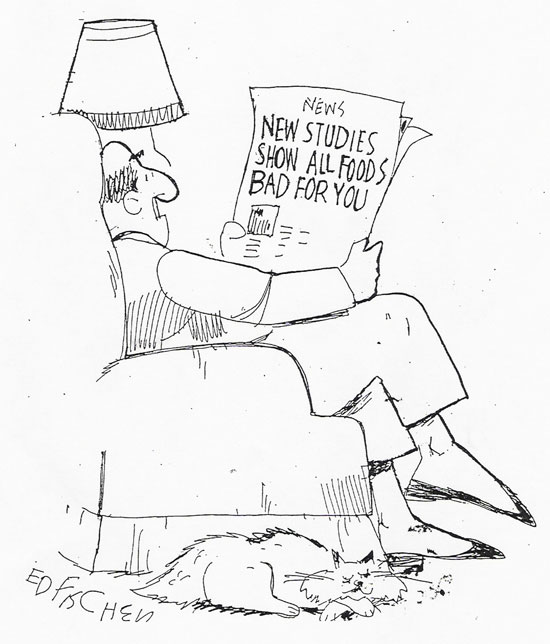Martin Luther King, Jr. once said, "Our lives begin to end the day we become silent about things that matter." I try to remember this when I write about nutrition. The fact is, I'm not a doctor or a nutritionist and who the heck cares to listen to one more person telling them what to do? There are so many fad diets, exercises, and pills that promise to make you lose weight or be healthy (and, no, those two things aren't synonymous). Why should I add to this confusing noise when I'm not an expert?
 The answers I keep coming back to are: Because a lot of the "noise" is just trying to make a buck. And maybe it
takes a normal person with no ulterior motive to guide normal people who
are confused by the science. Because none of us are experts and we're floating in all this information and we don't know who to believe. And a lot of the "experts" feel pressure to have a theory (and be published) and use some really dubious science and logic to "back it up." And a lot of the other experts who have done great research with mind-blowingly logical conclusions get ignored by the institutions that could do something with the information. For example, if a hospital were to run a clinical trial on nutrition, where would it get the funding? How are most clinical trials funded? You guessed it, by pharmaceutical companies. And good for them! Sometimes they really help people! The thing is: some diseases need pills, just not all. The other thing about hospitals and research universities attached to hospitals is that they aren't in the business of healthy people. What they need are prescription medications, treatment centers, and surgery wards. They do try to prevent people from coming back, but they simply aren't in the business of preventing people from going there in the first place. So why do research on nutrition? Why allocate the funding? It's simply not rational. It would be like a hospital sponsoring research on wearing helmets on motorcycles, with a sliver of hope that they might get less head trauma cases in the ER.
The answers I keep coming back to are: Because a lot of the "noise" is just trying to make a buck. And maybe it
takes a normal person with no ulterior motive to guide normal people who
are confused by the science. Because none of us are experts and we're floating in all this information and we don't know who to believe. And a lot of the "experts" feel pressure to have a theory (and be published) and use some really dubious science and logic to "back it up." And a lot of the other experts who have done great research with mind-blowingly logical conclusions get ignored by the institutions that could do something with the information. For example, if a hospital were to run a clinical trial on nutrition, where would it get the funding? How are most clinical trials funded? You guessed it, by pharmaceutical companies. And good for them! Sometimes they really help people! The thing is: some diseases need pills, just not all. The other thing about hospitals and research universities attached to hospitals is that they aren't in the business of healthy people. What they need are prescription medications, treatment centers, and surgery wards. They do try to prevent people from coming back, but they simply aren't in the business of preventing people from going there in the first place. So why do research on nutrition? Why allocate the funding? It's simply not rational. It would be like a hospital sponsoring research on wearing helmets on motorcycles, with a sliver of hope that they might get less head trauma cases in the ER. I used to think every doctor had all the answers. Every single person who went through medical school was some kind of genius and joined the club of geniuses who had all the answers. They all spent so much time and money studying enormous textbooks and being mentored by other doctors that they must have gotten all the answers. I thought, "doctors, well, they are just way smarter than me." And a lot of them still are WAY smarter than me. I'm really, really thankful for all of them. They are amazing people who do an incredibly important job.
Without taking away from any of what I just said, here's the thing that's important to know about doctors: When they were in medical school they took notes on lectures and read books that had the facts, and then they were tested on those lectures and books. Same thing in residency, they were shown how to operate or perform a procedure or how to diagnosis a patient based on those same books they just finished studying. At no point did anyone at any med school, anywhere say to these students, "By the way, the facts might be wrong, so you should really check all those footnotes and sources in your books and see how they came up with this information." That's not to say that doctors don't stay up on new research, but new research isn't the same as revisiting old research. And revisiting old research is not all that common, especially when it comes to nutrition (such as research on cholesterol and red meat). So often this old research relies on association instead of causation.
“For the greatest enemy of truth is very often not the lie — deliberate, contrived and dishonest — but the myth — persistent, persuasive, and unrealistic. Too often we hold fast to the clichés of our forebears. We subject all facts to a prefabricated set of interpretations. We enjoy the comfort of opinion without the discomfort of thought.”
- John F. Kennedy, Yale University commencement address (June 11, 1962)

No comments:
Post a Comment